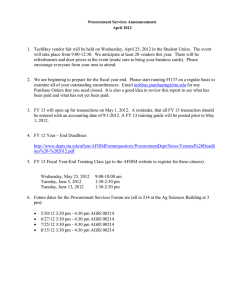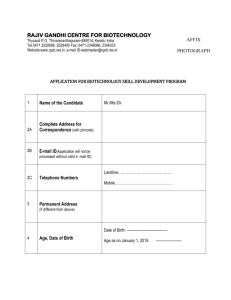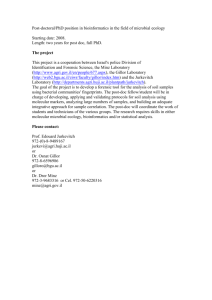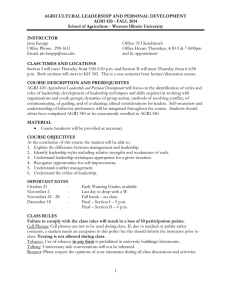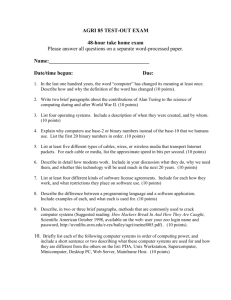BSc (Hons) Applied Biochemistry (Full-time) 1. Objectives
advertisement
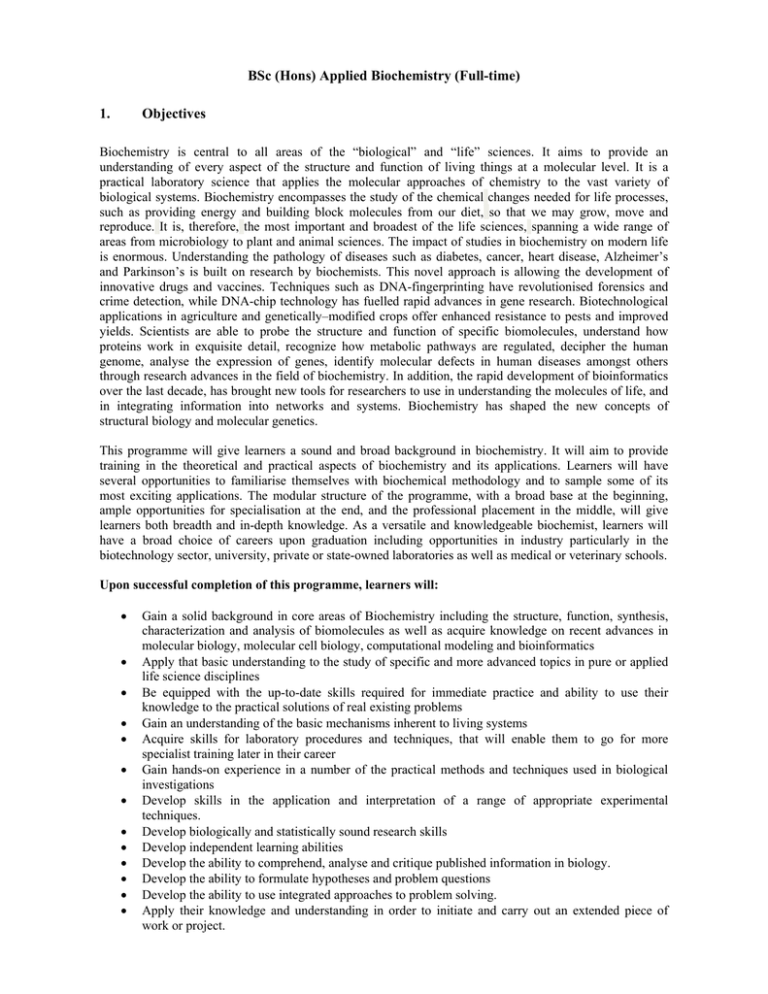
BSc (Hons) Applied Biochemistry (Full-time) 1. Objectives Biochemistry is central to all areas of the “biological” and “life” sciences. It aims to provide an understanding of every aspect of the structure and function of living things at a molecular level. It is a practical laboratory science that applies the molecular approaches of chemistry to the vast variety of biological systems. Biochemistry encompasses the study of the chemical changes needed for life processes, such as providing energy and building block molecules from our diet, so that we may grow, move and reproduce. It is, therefore, the most important and broadest of the life sciences, spanning a wide range of areas from microbiology to plant and animal sciences. The impact of studies in biochemistry on modern life is enormous. Understanding the pathology of diseases such as diabetes, cancer, heart disease, Alzheimer’s and Parkinson’s is built on research by biochemists. This novel approach is allowing the development of innovative drugs and vaccines. Techniques such as DNA-fingerprinting have revolutionised forensics and crime detection, while DNA-chip technology has fuelled rapid advances in gene research. Biotechnological applications in agriculture and genetically–modified crops offer enhanced resistance to pests and improved yields. Scientists are able to probe the structure and function of specific biomolecules, understand how proteins work in exquisite detail, recognize how metabolic pathways are regulated, decipher the human genome, analyse the expression of genes, identify molecular defects in human diseases amongst others through research advances in the field of biochemistry. In addition, the rapid development of bioinformatics over the last decade, has brought new tools for researchers to use in understanding the molecules of life, and in integrating information into networks and systems. Biochemistry has shaped the new concepts of structural biology and molecular genetics. This programme will give learners a sound and broad background in biochemistry. It will aim to provide training in the theoretical and practical aspects of biochemistry and its applications. Learners will have several opportunities to familiarise themselves with biochemical methodology and to sample some of its most exciting applications. The modular structure of the programme, with a broad base at the beginning, ample opportunities for specialisation at the end, and the professional placement in the middle, will give learners both breadth and in-depth knowledge. As a versatile and knowledgeable biochemist, learners will have a broad choice of careers upon graduation including opportunities in industry particularly in the biotechnology sector, university, private or state-owned laboratories as well as medical or veterinary schools. Upon successful completion of this programme, learners will: Gain a solid background in core areas of Biochemistry including the structure, function, synthesis, characterization and analysis of biomolecules as well as acquire knowledge on recent advances in molecular biology, molecular cell biology, computational modeling and bioinformatics Apply that basic understanding to the study of specific and more advanced topics in pure or applied life science disciplines Be equipped with the up-to-date skills required for immediate practice and ability to use their knowledge to the practical solutions of real existing problems Gain an understanding of the basic mechanisms inherent to living systems Acquire skills for laboratory procedures and techniques, that will enable them to go for more specialist training later in their career Gain hands-on experience in a number of the practical methods and techniques used in biological investigations Develop skills in the application and interpretation of a range of appropriate experimental techniques. Develop biologically and statistically sound research skills Develop independent learning abilities Develop the ability to comprehend, analyse and critique published information in biology. Develop the ability to formulate hypotheses and problem questions Develop the ability to use integrated approaches to problem solving. Apply their knowledge and understanding in order to initiate and carry out an extended piece of work or project. 2. General Entry Requirements In accordance with General Entry Requirements for Admission to the University for Undergraduate Degrees. 3. Programme Requirements SC: Credit in Mathematics, Biology and Chemistry 2 GCE 'A' Levels passes in related approved Science subjects (Mathematics, Chemistry, Physics, Biology or Food Studies) Preference will be given to candidates holding ‘A’ levels in Chemistry and Mathematics. 4. Programme Duration Normal (Years) Degree Maximum (Years) 3 5 5. Credits per Year: Minimum 18 credits, Maximum 48 credits subject to Regulation 4. 6. Minimum Credits Required for Award of Undergraduate Degree: 101 Breakdown as follows: Degree Credits from Core Taught Modules 92 Project 9 The module Practical Training – AGRI 2000 and the module Scientific Communication Skills & Methods – AGRI 2130 must be completed satisfactorily for the award of the degree. Students may exit with a: 7. Certificate after having earned 30 credits in core modules. Diploma after having earned 60 credits in core modules. Assessment Each module will be assessed over 100 marks (i.e. expressed as %) with details as follows (unless otherwise specified). Assessment will be based on a Written Examination of 2-3 hour duration, carrying a weighting of 70%, and Continuous Assessment carrying 30% of total marks for AGRI modules. Modules from other Faculties/Departments/Centres will carry weighting in the Written Examination and the Continuous Assessment as specified by the Faculties/Departments/Centres concerned. Continuous Assessment will be based on laboratory/field works, and/or assignments, and should include at least 1 class test. An overall total of 40% for combined continuous assessment and written examination components would be required to pass the module, without minimum thresholds within the individual continuous assessment and written examination. Modules will carry the weightings of 1, 3 or 5 depending on their status (Introductory, Intermediate or Advanced). Weighting for a particular module is indicated within parentheses in the module code. FACULTY OF AGRICULTURE – Programmes of Studies (Academic Year 2014-2015) Page 2 of 8 Each module will carry credits in the range of 3 to 6. Project – AGRI 3000Y(5) will carry 9 credits. Assessment of the module AGRI 2130 - Scientific Communication Methods & Skills will be based on continuous assessment of students throughout the module and/or submission of a portfolio. The module carries no credits. For satisfactory completion of the module, a minimum of 40% should be attained. Assessment of practical training will be based on the on-site supervisor’s evaluation and the student’s portfolio. For satisfactory completion of the practical training, a minimum of 40% should be attained. Written examinations for AGRI modules will be carried out at the end of Semester I and Semester II. Submission Deadlines for Dissertation: First Draft: by last week day of February of the Academic Year to the project supervisor(s) Final Copy: three copies of the dissertation (2 spiral-bound copies and 1 soft copy in a single PDF text file on an electronic storage media) should be submitted to the Faculty/Center Registry not later than the last week day of March of the Academic Year by 4.00 p.m at latest. 8. Academic Teaching in Case of an Emergency To ensure minimal disruption of normal academic teaching in case of an emergency (e.g. closure of the University for more than 2 weeks), the i.Learn e-Learning Platform of VCILT will be used to deliver Teaching and Learning content. Relevant learning resources will be posted on the Platform. Assignments (if any) will be submitted using the online submission box. Arrangements will be made to register students on the e-Learning platform at the beginning of the academic year. 9. Code List of Modules Module Name AGRI 1087Y(1) AGRI 1057Y(1) AGRI 1088Y(1) AGRI 1077Y(1) AGRI 1056Y(1) AGRI 1089Y(1) AGRI 1059Y(1) AGRI 2081Y(3) AGRI 2008Y(3) AGRI 2150Y(3) AGRI 2151Y(3) AGRI 2152Y(3) AGRI 2153Y(3) AGRI 2154Y(3) AGRI 2000 AGRI 2130 AGRI 3000Y(5) AGRI 3065Y(5) AGRI 3120Y(5) AGRI 3121Y(5) AGRI 3122Y(5) AGRI 3123Y(5) AGRI 3068Y(5) Chemistry Fundamentals Basic Microbiology and Techniques Food Biochemistry and Enzymology Biotechniques and Analytical Methods Introductory Statistics Biochemistry Fundamentals Plant, Animal and Human Physiology Statistical Methods and Computational Biology Molecular and Cell Biology Immunology and Cell Signalling Protein Biochemistry Bioreactor and Bioprocess technology Introduction to Bio-nanotechnology Clinical Biochemistry Practical Training Scientific Communication Skills & Methods Project Genomics and Proteomics Applied Food Biochemistry Medical Biochemistry Pharmacology and Pharmacognosy Environmental Biochemistry Bioinformatics Hr / Yr L+P 60+60 60+60 30+30 60+60 30+30 30+30 60+60 60+60 60+60 45+60 45+60 45+30 30+30 45+30 35+0 60+60 30+30 45+30 45+30 45+30 45+60 Credits 6 6 3 6 3 3 6 6 6 5 5 4 3 4 9 6 3 4 4 4 5 Total Number of Credits = 101 AGRI 2000 - Practical Training can be done in either Year 1 or Year 2.AGRI 2130 - Scientific Communication Skills & Methods will be done in Semester 2 in Year 2. FACULTY OF AGRICULTURE – Programmes of Studies (Academic Year 2014-2015) Page 3 of 8 10. Programme Plan - BSc (Hons) Applied Biochemistry YEAR 1 Code Module Name AGRI 1087Y(1) Chemistry Fundamentals AGRI 1057Y(1) Basic Microbiology and Techniques AGRI 1088Y(1) Food Biochemistry and Enzymology AGRI 1077Y(1) Biotechniques and Analytical Methods AGRI 1056Y(1) Introductory Statistics AGRI 1089Y(1) Biochemistry Fundamentals AGRI 1059Y(3) Animal, Human and Plant Physiology Total credits= 33 credits Hr / Yr L+P 60+60 60+60 30+30 60+60 30+30 30+30 60+60 Credits Hr / Yr L+P 60+60 60+60 45+60 45+60 45+30 30+30 45+30 35+0 Credits 6 6 3 6 3 3 6 YEAR 2 Code Module Name AGRI 2081Y(3) AGRI 2008Y(3) AGRI 2150Y(3) AGRI 2151Y(3) AGRI 2152Y(3) AGRI 2153Y(3) AGRI 2154Y(3) AGRI 2000 AGRI 2130 Statistical Methods and Computational Biology Molecular and Cell Biology Immunology and Cell Signalling Protein Biochemistry Bioreactors and Bioprocess technology Introduction to Bio-nanotechnology Clinical Biochemistry Practical Training Scientific Communication Skills & Methods 6 6 5 5 4 3 4 - AGRI 2000 - Practical Training can be done in either Year 1 or Year 2. AGRI 2130 - Scientific Communication Skills & Methods will be done in Semester 2 in Year 2. Total credits = 33 credits YEAR 3 Code Module Name AGRI 3000Y(5) AGRI 3065Y(5) AGRI 3120Y(5) AGRI 3121Y(5) AGRI 3122Y(5) AGRI 3123Y(5) AGRI 3068Y(5) Project Genomics and Proteomics Applied Food Biochemistry Medical Biochemistry Pharmacology & Pharmacognosy Environmental Biochemistry Bioinformatics Hr / Yr L+P 60+60 30+30 45+30 45+30 45+30 45+60 Credits 9 6 3 4 4 4 5 Total credits: 35 Total Number of Credits = 101 FACULTY OF AGRICULTURE – Programmes of Studies (Academic Year 2014-2015) Page 4 of 8
